UC San Diego Earns National Recognition for Economic Partnerships
Published Date
By:
- Office of Research Affairs
Share This:
Article Content

The University of California San Diego has been named an Innovation and Economic Prosperity University by the Association of Public and Land-grant Universities, a designation that fewer than 60 universities nationwide have achieved.
Founded in 1887, the 237-member Association of Public and Land-grant Universities, or APLU, is North America's oldest higher education association with member institutions in all 50 U.S. states, the District of Columbia, four U.S. territories, Canada and Mexico. Created by the APLU’s Commission on Competitiveness, Innovation, and Economic Prosperity (CICEP), the Innovation and Economic Prosperity Program recognizes universities that are leaders in spurring regional economic development.
“We are especially proud of this designation because UC San Diego is committed to building shared economic and social prosperity within the San Diego region,” said UC San Diego Chancellor Pradeep K. Khosla. “Our mission of education, research and service is strongly tied to our region’s success. We look beyond today’s challenges to innovate, collaborate, and create tomorrow’s solutions.”
The recognition is the result of a nearly year-long process that convened economic engagement experts from across the La Jolla campus. Together, the group gauged contributions to the regional economy, ranging from startup creation to job growth, and community health clinics to millions of dollars in procurement from small businesses based in San Diego County.
Participants cited the university’s role in workforce development, innovation and entrepreneurship, and civic growth. The designation emphasizes mutual engagement, where UC San Diego continues to expand K-12 programs, community-based research, employment, procurement, and bench-to-bedside health services. Working with stakeholders, the university highlighted many long-term collaborations with regional partners.
Among key findings, UC San Diego’s study identified 106 startups launched over the past three years, roughly half of which were created by students through campus incubator and accelerator programs. The fledgling companies have attracted $125 million in external funds and have already begun adding jobs to the local economy. Other highlights included regional initiatives like the Blum Cross-Border Community Stations, the Collaboratory for Downtown Innovation, the CaliBaja Center for Resilient Materials and Systems, and marine science outreach through the Scripps Institution of Oceanography.
The university has seen success in working with entrepreneurs and the private sector to translate its $1 billion research portfolio into new products and services. Technologies invented in UC San Diego labs are being put into practice by companies in 30 states across the US, with the majority helping companies in California. In 2016, university inventors were awarded 93 new US patents. The university supports entrepreneurs through more than a dozen accelerators, incubators, proof-of-concept programs, funding opportunities and competitions. Industry partners can access dozens of core services and work alongside researchers in facilities like the Qualcomm Institute Innovation Space and recently announced Center for Novel Therapeutics.
Jim Woodell, vice president for economic development and community engagement at the APLU, welcomed the inclusion of UC San Diego as an Innovation and Economic Prosperity University.
“One of our goals is to understand the role of universities as economic partners” he said. “We hope that recipients use this process to learn from others and build on the outstanding efforts that each has developed.”
UC San Diego has been a prominent voice as the APLU examines the role of universities for public benefit. Chancellor Khosla currently serves as chair of CICEP, while Associate Chancellor for Innovation and Commercialization Paul Roben co-chairs a working group on the evolution of technology transfer, and Mary Walshok, associate chancellor for public programs and dean of Extension, serves on the Task Force on the New Engagement.
Roben is pleased to see UC San Diego gaining notice as an innovation leader. “New ideas,” he says, “are everywhere, so engagement is key to everything we do. We want to be a strategic partner, to build meaningful relationships that will enable our students, faculty, alumni, and broader community to grow the businesses and jobs of the future.”
UC San Diego will be recognized for its new designation at the APLU Annual Meeting in November in Washington, DC.
Share This:
You May Also Like
Stay in the Know
Keep up with all the latest from UC San Diego. Subscribe to the newsletter today.



